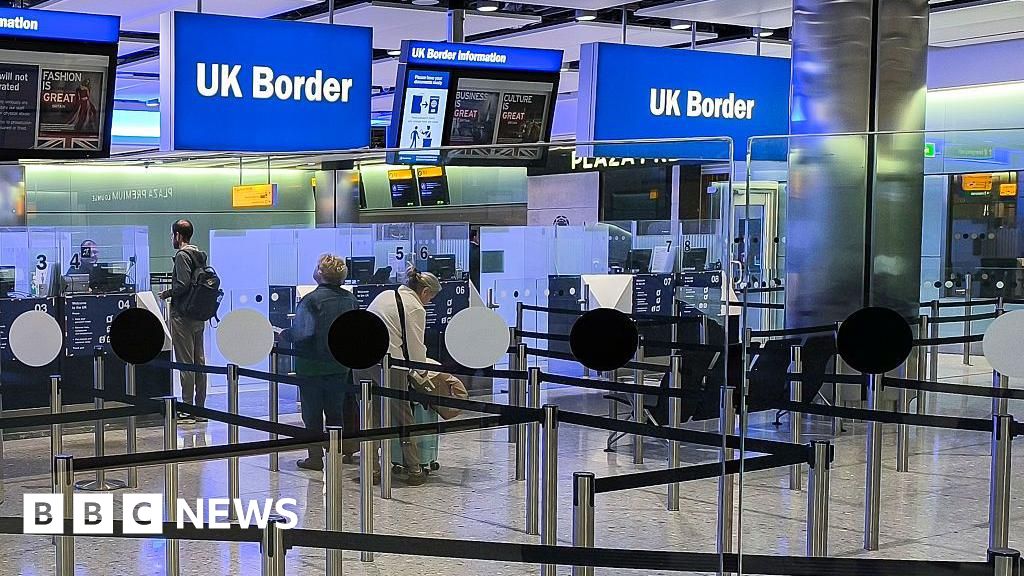Introduction: A Shift in UK Immigration Policy
In a significant policy shift announced on May 12, 2025, the British government, under Prime Minister Keir Starmer, unveiled plans to overhaul the country's immigration system. One of the most striking measures is the proposal to double the waiting period for some migrants to qualify for permanent settlement, extending it from five to ten years. This change, aimed at reducing net migration, has sparked intense debate across political, social, and economic spheres. While the government argues that the reforms are necessary to regain control over immigration numbers, critics warn of potential social alienation, economic disruption, and ethical concerns. This article delves into the details of the policy, its historical context, the hidden truths behind the decision, and the broader implications for the UK and its migrant communities.
Understanding the Policy: Key Details and Scope
The Five-to-Ten-Year Extension
The core of the new policy is the extension of the time required for certain migrants to qualify for permanent settlement, also known as indefinite leave to remain (ILR). Previously, most migrants could apply for ILR after five years of continuous residence in the UK, provided they met other criteria such as language proficiency and financial stability. Under the proposed changes, this period would double to ten years for many categories of migrants, significantly delaying their ability to secure permanent residency or apply for British citizenship.
Government officials have clarified that the extended waiting period will not apply universally. Migrants who arrived on family visas or as dependents will retain the five-year route to settlement. Additionally, EU citizens who applied for settled status post-Brexit under the EU Settlement Scheme are likely exempt, as their rights were enshrined in the 2020 Brexit agreement. However, the policy will affect a broad range of other migrants, including those on work visas, student visas transitioning to work routes, and other non-family visa holders.
Policy Implementation and Consultation
The announcement, made during a press conference in London, emphasized that the policy is still in the consultation phase. A spokesperson for Prime Minister Starmer stated that stakeholder input would be sought before the changes are finalized. This consultation process is intended to address concerns from various sectors, including legal experts, migrant advocacy groups, and businesses reliant on immigrant labor. However, the lack of immediate clarity on whether the policy will apply retroactively to migrants already in the UK has caused uncertainty and anxiety among affected communities.
Historical Context: Immigration as a Political Flashpoint
The Brexit Legacy
Immigration has been a contentious issue in the UK for decades, with its significance amplified by the 2016 Brexit referendum. The vote to leave the European Union was driven, in part, by public demand for greater control over borders and a reduction in net migration. Promises to "take back control" resonated with voters concerned about the perceived strain on public services, housing, and job markets. However, post-Brexit data reveals a paradoxical trend: net migration reached record highs, peaking at over 700,000 annually in recent years, according to the Office for National Statistics (ONS).
This surge in migration, despite the end of EU free movement, has been attributed to several factors, including increased demand for skilled workers in sectors like healthcare and technology, as well as humanitarian visa schemes for Ukrainians and Hong Kongers. The failure to curb migration numbers has fueled the rise of right-wing, anti-immigration parties like Reform UK, led by Nigel Farage, which capitalized on public frustration in recent elections.
Echoes of Enoch Powell
Prime Minister Starmer’s rhetoric, particularly his warning that Britain risks becoming "an island of strangers" if immigration remains unchecked, has drawn comparisons to Enoch Powell’s infamous 1968 "Rivers of Blood" speech. Powell, a polarizing figure, warned of social fragmentation and violence due to unchecked immigration, using language that was widely condemned as inflammatory. While Starmer’s spokesperson has rejected any parallels, emphasizing the positive contributions of migrants, the choice of language has raised eyebrows among historians and political analysts.
"The comparison to Powell is not about intent but about impact. Starmer’s words, however well-meaning, risk legitimizing narratives that frame migrants as a threat to social cohesion." — Dr. Sarah Thompson, Political Historian at the University of Oxford
The Hidden Truths: Motivations and Challenges
Political Pressures and Public Sentiment
The decision to extend settlement wait times reflects the Starmer government’s attempt to balance competing pressures. On one hand, Labour faces criticism from its progressive base, which champions multiculturalism and migrant rights. On the other, the party is under pressure to address voter concerns about immigration, particularly in constituencies that switched to Labour in the 2024 general election. Polls conducted by YouGov in early 2025 indicate that 62% of UK voters consider immigration a top issue, with 45% supporting stricter policies.
The policy also serves as a response to the growing influence of Reform UK, which has pushed for a near-total freeze on non-essential immigration. By adopting a tougher stance, Starmer aims to neutralize this threat while maintaining Labour’s broader commitment to social justice. However, this delicate balancing act risks alienating both sides, as evidenced by the backlash from Labour MPs like Florence Eshalomi, who chairs the Commons housing, communities, and local government committee.
Economic Considerations
The UK’s economy heavily relies on migrant labor, particularly in sectors like healthcare, construction, and hospitality. The National Health Service (NHS), for instance, employs over 200,000 non-UK nationals, representing 15% of its workforce. Extending the settlement period could deter skilled workers from staying long-term, exacerbating labor shortages. A 2024 report by the Migration Advisory Committee (MAC) warned that restrictive immigration policies could lead to a 0.5% reduction in GDP growth over five years.
Business leaders have expressed concern that the policy could make the UK less attractive to global talent. The Confederation of British Industry (CBI) issued a statement urging the government to consider exemptions for high-skill sectors. Meanwhile, small businesses, particularly in retail and agriculture, fear that prolonged uncertainty for migrant workers could disrupt operations.
Social and Ethical Implications
Impact on Migrant Communities
For migrants already in the UK, the proposed changes introduce significant uncertainty. Many have built lives, careers, and families in Britain, expecting to qualify for permanent settlement after five years. The prospect of an additional five-year wait has led some to reconsider their future in the country. Labour MP Florence Eshalomi shared the story of a constituent, a skilled professional, who is now contemplating leaving the UK due to the prolonged path to security.
Migrant advocacy groups, such as the Joint Council for the Welfare of Immigrants (JCWI), have condemned the policy as discriminatory and counterproductive. They argue that extending settlement periods disproportionately affects non-EU migrants, who often face stricter visa conditions than their EU counterparts. This disparity could deepen inequalities and foster resentment among migrant communities.
Human Rights Concerns
Legal experts have raised questions about the policy’s compliance with international human rights standards. The European Convention on Human Rights (ECHR), to which the UK remains a signatory, guarantees the right to family and private life. Prolonging the settlement process could be seen as undermining these rights, particularly for migrants who have integrated into British society. Farrer & Co, a prominent law firm, noted that retroactive application of the policy could face legal challenges, especially if it disrupts the expectations of migrants already on the settlement pathway.
Research and Data: What the Numbers Say
Migration Trends and Projections
According to the ONS, net migration to the UK stood at 685,000 in 2024, down slightly from the 2023 peak of 745,000. Non-EU migration, particularly from countries like India, Nigeria, and Pakistan, has driven much of this growth, with work visas accounting for 40% of arrivals. The government’s target, as outlined by Home Secretary Yvette Cooper, is to reduce net migration to a "sustainable" level, though no specific figure has been defined.
Research from the Institute for Public Policy Research (IPPR) suggests that extending settlement periods may have a limited impact on overall migration numbers. Many migrants, particularly those on skilled worker visas, are motivated by economic opportunities rather than the prospect of immediate permanent residency. However, the policy could reduce retention rates, as some may choose to relocate to countries with more straightforward pathways to citizenship, such as Canada or Australia.
Public Opinion and Social Cohesion
A 2025 study by the British Social Attitudes Survey found that 55% of respondents support reducing immigration, but only 30% believe that migrants negatively impact social cohesion. This suggests a complex public sentiment: while many favor lower numbers, they also recognize the contributions of migrants. Policies that appear punitive, such as extended settlement periods, risk alienating moderate voters who value fairness and integration.
Comparative Perspectives: Global Approaches to Migration
Canada and Australia
The UK’s proposed policy contrasts with the immigration systems of Canada and Australia, both of which prioritize swift pathways to permanent residency for skilled migrants. In Canada, the Express Entry system allows qualified candidates to apply for permanent residency within 12–18 months of arrival. Australia’s points-based system similarly fast-tracks skilled workers, with permanent residency achievable within three to four years. These models have enabled both countries to attract and retain global talent, contributing to economic growth.
By contrast, the UK’s ten-year settlement period would place it among the most restrictive systems in the developed world, potentially undermining its competitiveness in the global labor market. A 2024 OECD report highlighted that countries with longer settlement pathways tend to experience higher rates of migrant turnover, as workers seek more stable opportunities elsewhere.
EU Migration Policies
Within the EU, settlement policies vary widely. Germany, for instance, offers permanent residency to skilled workers after four years, provided they demonstrate language proficiency and financial stability. France and Spain have similar timelines, though with more bureaucratic hurdles. The UK’s proposed ten-year wait would make it an outlier among major European economies, potentially discouraging migrants who might otherwise consider the UK as a destination post-Brexit.
Potential Consequences and Future Outlook
Economic and Demographic Impacts
The UK faces a demographic challenge, with an aging population and declining birth rates. Migrants, who tend to be younger and economically active, play a critical role in sustaining the workforce and funding public services like the NHS and pensions. A 2023 study by the Resolution Foundation estimated that reducing net migration to below 300,000 annually could lead to a £10 billion shortfall in tax revenues by 2030. The extended settlement period, by discouraging long-term stays, could exacerbate this issue.
Political Ramifications
For Labour, the policy represents a high-stakes gamble. While it may appease voters concerned about immigration, it risks alienating the party’s progressive base and migrant communities, who were instrumental in Labour’s 2024 election victory. The backlash from MPs like Eshalomi suggests that internal divisions could intensify, potentially undermining Starmer’s leadership.
Social Cohesion and Integration
Prolonged settlement periods could hinder integration by creating a sense of impermanence among migrants. Research from the Migration Observatory at the University of Oxford indicates that secure legal status is a key determinant of social integration, influencing everything from language acquisition to community involvement. By delaying this security, the UK risks fostering a sense of exclusion, which could undermine its multicultural identity.
Conclusion: Navigating a Complex Path Forward
The UK’s decision to double the permanent settlement wait time for certain migrants reflects the complex interplay of political, economic, and social forces shaping immigration policy. While the government seeks to address public concerns and reduce net migration, the policy raises significant ethical and practical questions. Its success will depend on careful implementation, robust consultation, and a commitment to balancing control with compassion. As the UK navigates this new chapter, the world will be watching to see whether it can reconcile its immigration goals with its values as an open, diverse society.



















0 Comments